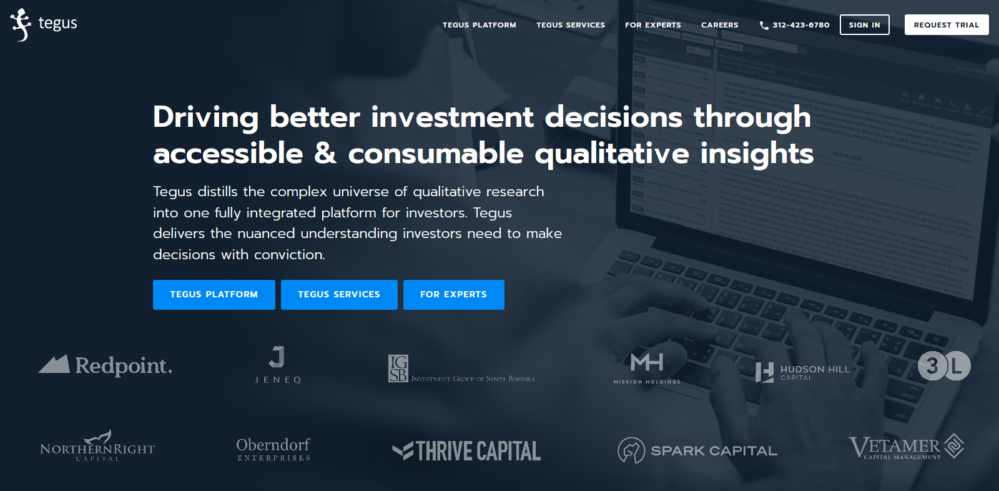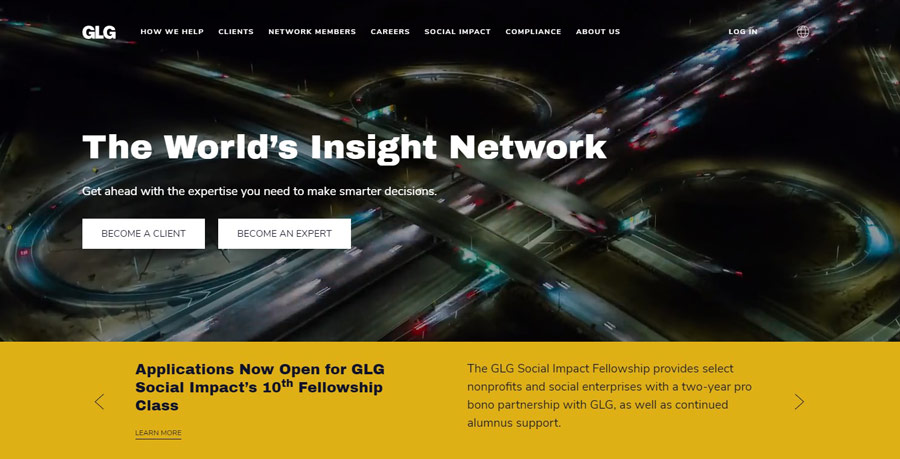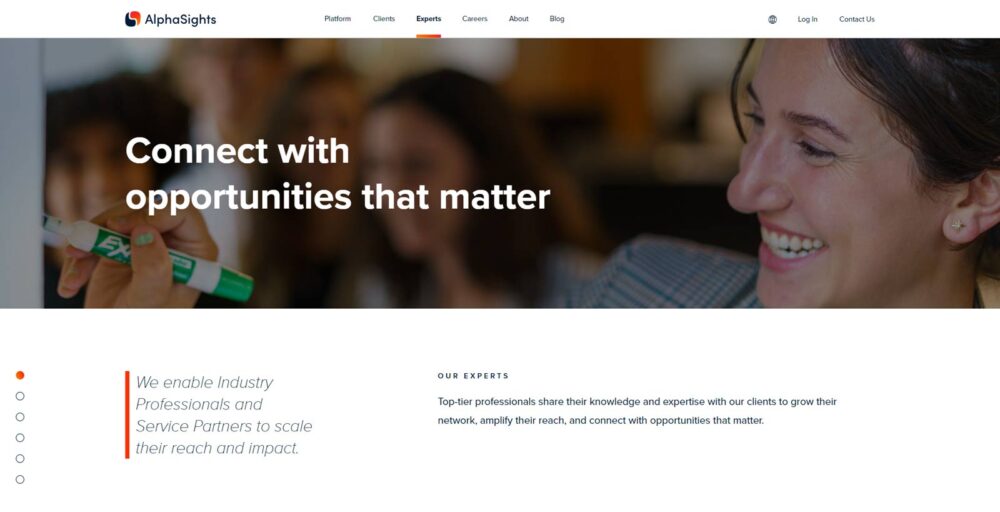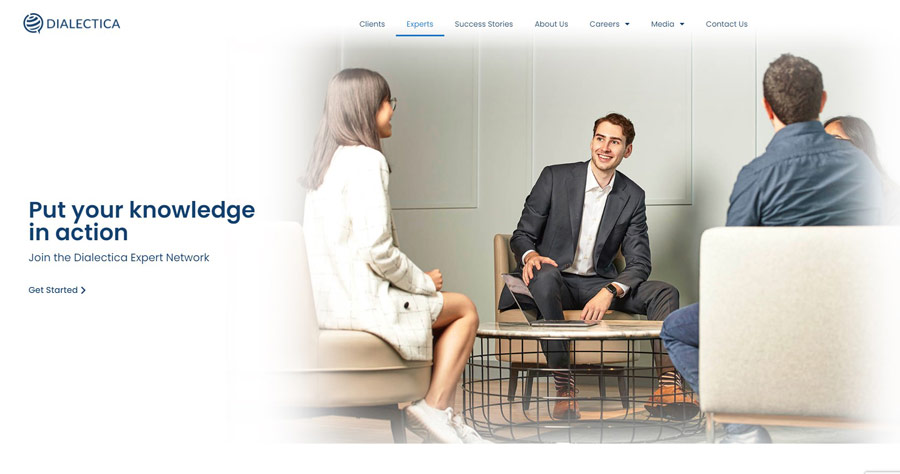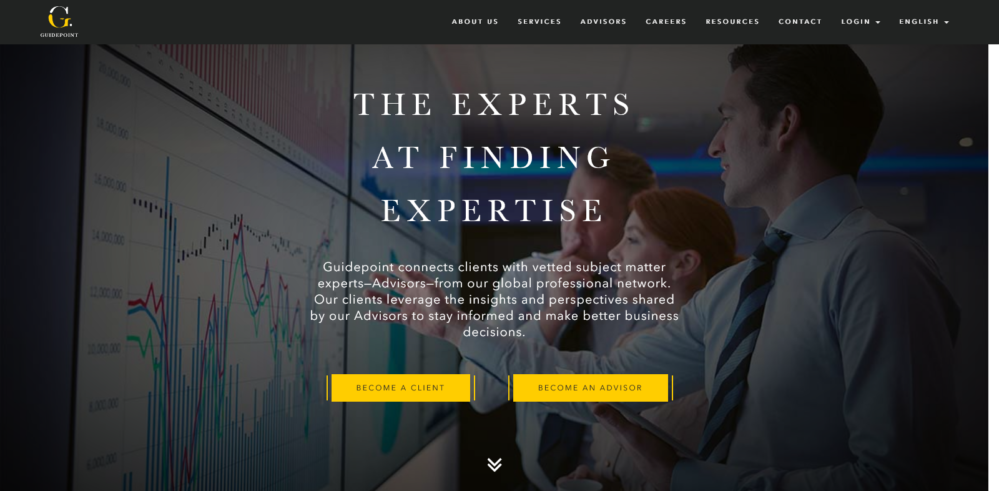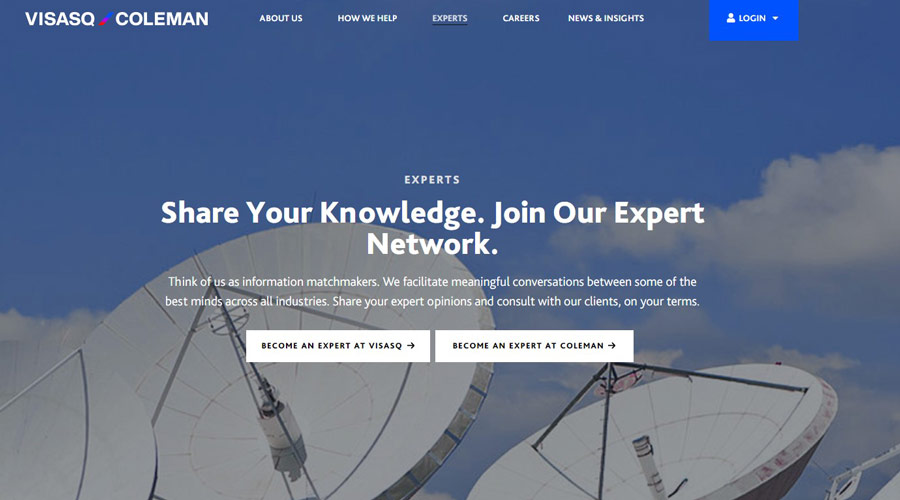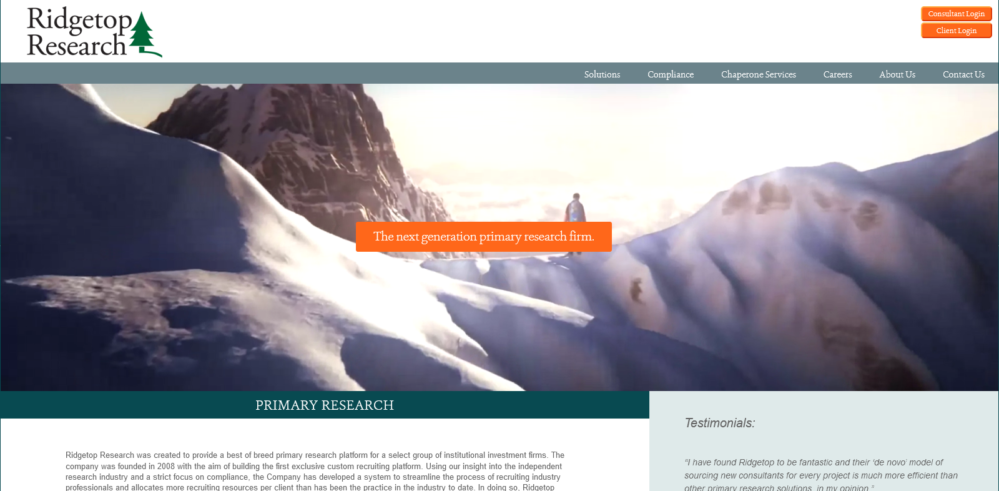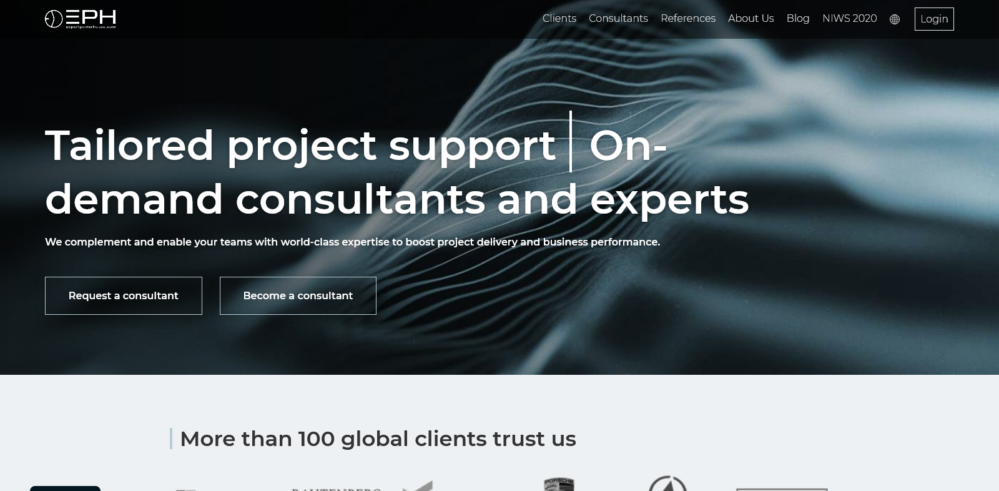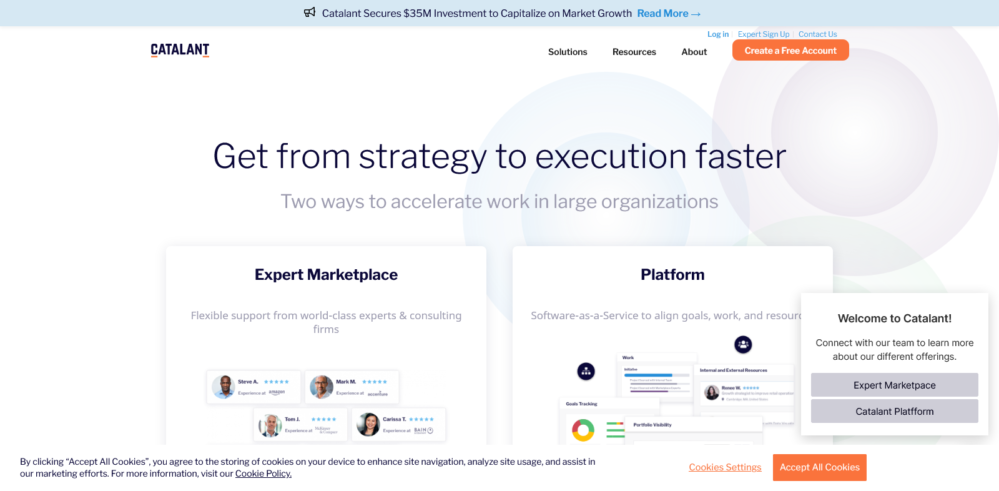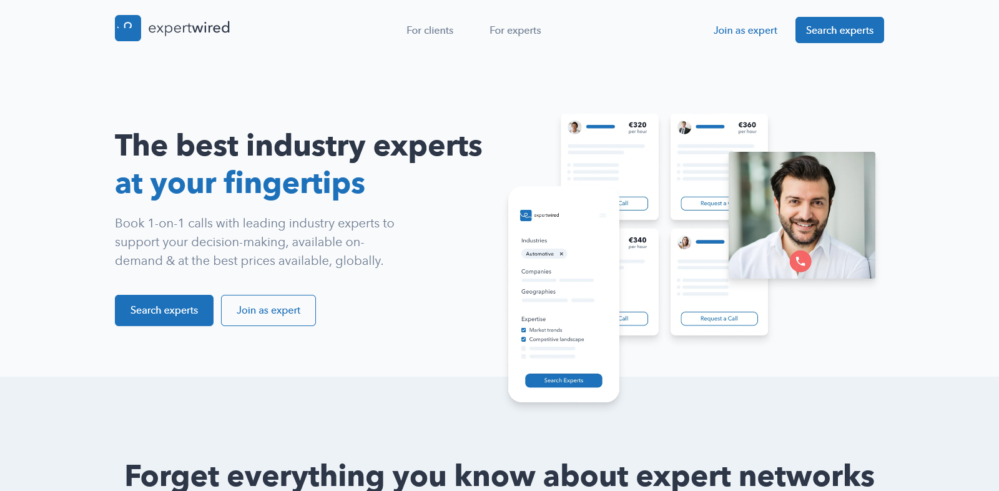What is Tegus Expert Network?
Tegus is an expert network that connects subject matter specialists with clients doing extensive research on a company, product or market. They come from many industries and have a wide range of experience. These experts are often former employees, competitors, or key influences of the business the client is researching.
Tegus was established in 2016 by Michael Elnick and Thomas Elnick, an AlphaSights associate. The two served as co-founders and co-CEOs. In November 2021, Oberndorf Enterprises led a $90 million Series A funding round, and Willoughby Capital invested $1.5 million in venture capital. The company purchased BamSEC in late 2021. This platform makes it easy for users to access and use SEC filings. Tegus has its headquarters in Chicago and a European office located in Waterford, Ireland. More than 300 employees work for the company, which serves more than 1,000 customers.
“Making informed investment decisions requires a 360-degree view of a company, but in today’s world, finding and capturing the right primary perspectives, aggregating filings and public information, and modeling outcomes is too slow and tedious. That’s where Tegus comes in.”
What’s the concept?
Tegus adopts an unconventional business and pricing model to cater to its clients. Instead of charging exorbitant fees like other major firms in the industry, such as GLG and Guidepoint Global Advisors, Tegus clients typically pay a mere $75 markup on the expert’s consulting fee. This transparent approach contrasts significantly with rates of $1,000 or more charged by its larger counterparts.
The $75 fee covers various services, including expert sourcing and management, compliance checks and monitoring, as well as recording and transcription of the consulting calls. This comprehensive package ensures clients get the necessary support and information they seek without breaking the bank.
Your call will be transcribed and shared through a library
Tegus generates most of its revenue by granting access to its platform, which hosts an expansive library of over 50,000 expert calls featuring former executives and customers from both public and private companies. These transcripts become available to all Tegus clients approximately two weeks after each call takes place. It’s important to note that access to this valuable platform starts at around $20,000 per year, making sure the transcripts remain exclusive to Tegus clients and are not shared publicly.
The Tegus platform offers clients robust quantitative and qualitative workflows, industry KPI dashboards, and an advanced search engine. These powerful tools enable their clients to conduct thorough, efficient, and effective deep research across various data sources, simplifying the complexity of the task.
In the published transcripts, your employment history and bio will be included, but your name will be concealed. However, discerning clients could potentially identify you through online searches on platforms like Google and LinkedIn. Therefore, it’s wise to consider how candid you wish to be during the calls. It’s worth mentioning that experts don’t receive any additional compensation when other clients access the transcripts of their calls.
Compared to Stream by Alphasense, Tegus stands out as a better option for experts, as Stream not only provides a library of recorded and transcribed calls to all clients but often doesn’t pay experts for their initial call. This aspect is among several reasons why contributing to expert network transcript libraries might not be appealing to some individuals.
Tegus Hourly Consulting Rates: What Should Consultants Ask?
What is a good consulting rate for Tegus? As consultants venture into ad-hoc consulting with the expert network Tegus, understanding the appropriate hourly rates is crucial. Let’s explore the range of rates commonly charged by consultants at different levels within Tegus.
Typically, young professionals and lower-level managers often set their consulting rates between $100 and $200 per hour. As we move up the hierarchy, mid-level managers, such as Directors and VPs, usually charge between $200 and $500 per hour. Meanwhile, senior executives holding titles like EVPs, SVPs, and C-level managers, often command rates starting at $500 or more.
However, it is essential to note that a specific title does not automatically warrant a particular hourly consulting rate. Various factors come into play, including company size and the scarcity of information in a consultant’s area of expertise.
For instance, consider a former CFO of a Fortune 500 company with in-depth knowledge of a niche industry experiencing significant M&A activity. This expert’s unique insights could allow them to demand higher rates compared to a CFO executive in a medium-sized business operating within a larger business domain.
Beyond external factors, consultants should also consider their personal goals and preferences when setting their rates. Some may choose to maximize income by offering competitive rates to attract more projects. Others might prioritize working on fewer but highly relevant projects, allowing them to charge a premium for their specialized expertise.
Determining the right consulting rate with Tegus requires a balanced evaluation of various factors, including professional background, market demand, and individual objectives. By understanding the range of rates and considering personal preferences, consultants can position themselves for success in the dynamic world of ad-hoc consulting with Tegus.
What happens during the consultation?
A typical Tegus consulting project is between 45 and 60 minutes. The client needs to learn from experts who have extensive hands-on experience quickly. Expert network consulting with companies like Tegus can provide a great source of additional income. The firm has high hourly rates, and schedules calls conveniently for the consultant. Projects are often very short, with little preparation and no follow-up.
Tegus is a specialist network that focuses on investors. It works with mutual fund managers and venture capitalists, while some expert networks focus more on clients. Tegus claim it has hosted over 20,000 client calls and arranges more than 900 per month. The transcripts of all Tegus client calls can be accessed by the entire client base, in a unique twist to the expert network model.
Mastering Your Tegus Client Call
Okay, you’ve done the vetting call, agreed on a rate, filled in the screening questions, been approved, and scheduled a call. What can you anticipate?
Most client calls focus on a particular company, industry, or product. The client will want to know the details of the industry— how it works, business models, verticals, customer types, competitive landscape, key growth drivers, challenges, and trends.
No need to prepare
The only thing you need to do in terms of preparations is to be on time and make sure you have an excellent connection to the conferencing tool. The client or Tegus is not expecting you to prepare for the call— they are looking to rapidly extract industry knowledge via your many years of experience. Clients have often already explored and reviewed publicly available information and heard management presentations. Now they are looking for someone with real-life experience in the industry who can confirm the spreadsheets and power points they have already made.
Most frequent client type: Investment firms
If you’re speaking with an investment manager, they are likely researching a distinct company; they will want to know how it compares to its competitors, product and feature differentiation, quality of management, etc. These calls through Tegus often revolve around your former employer or a significant vendor you work with frequently. In this case, they’ll want you to compare it to similar products you vetted, emphasizing the key factors influencing your decision.
Speaking to consulting firms
Alternatively, the client (through Tegus) may be a management consulting firm tasked with developing a marketing strategy, solving operational problems, restructuring an organization, or other issues. These calls will often dive into how you approach a particular issue or problem, your impressions of various products, how purchase and budget decisions are made, and provide feedback on some potential new products or proposed solutions.
You’ll usually have an easy time answering most questions during a Tegus call – after all, the client wants to learn about an area you’ve worked in for years. Of course, you may not have the answer to everything, so don’t feel bad for saying that you don’t have the answer to a specific question; the client will move on to the next question on their list, and they aren’t paying top dollar for made-up answers!
How do I get paid after my call?
Tegus is offering its network members payment directly to their bank account via direct deposit or electronic prepaid card. For members based outside of the United States, the country of your bank will determine the method and currency of your transferred payment, but most often include wire transfer or international direct deposit. Payments typically take 7–10 business days to be processed by Tegus before being sent to your bank. You will receive an email notification once your payment has been processed. You can track your payment status by clicking the “Payment” tab on your Tegus profile. From this page, you can view the payment status for all completed projects and the estimated date for payment. You can also view the account to which the payment was made.
The importance of compliance
It’s important to note that you’ll never be asked to share non-public or proprietary information. Tegus will provide you with clear compliance guidelines several times before you connect with the client. One of the critical responsibilities of expert networks is to ensure that improper information isn’t shared with clients, who are bound by strict compliance standards. You’ll rarely be asked to share any non-public information, and you should decline to answer any questions you feel move in this direction; clients won’t press you to share things that you shouldn’t.

